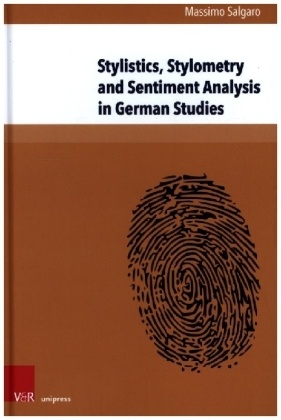
Stylistics, Stylometry and Sentiment Analysis in German Studies - The Operationalization of Literary Values
| Verlag | V&R unipress |
| Auflage | 2023 |
| Seiten | 201 |
| Format | 17,3 x 1,5 x 23,8 cm |
| Gewicht | 419 g |
| Artikeltyp | Englisches Buch |
| Reihe | Interfacing Science, Literature, and the Humanities / ACUME 2 Band 015 |
| ISBN-10 | 3847115707 |
| EAN | 9783847115700 |
| Bestell-Nr | 84711570A |
This publication offers a glimpse into "operationalization," a process through which the theoretical language and concepts of literary studies are translated into empirically observable properties.
A glimpse into "operationalization," a process through which the theoretical language and concepts of literary studies are translated into empirically observable properties
Can literature be investigated through quantitative methods? Can style, empathy, and prestige be measured? This study attempts to respond to these questions by providing results from a selection of case studies taken from German literature of the 19th through the 21st century, including Goethe's "late style", Felix Salten, and the output of contemporary writers such as Florian Meimberg's "twitterature" and Daniel Glattauer's e-mail novel. Altogether, this study shows how the interplay among literary theory, stylometry, stylistics, sentiment analysis, empirical studies, and archival research can offer new answers to old questions regarding German literature and provide tools to formulate new questions and novel approaches to research.
A glimpse into "operationalization," a process through which the theoretical language and concepts of literary studies are translated into empirically observable properties
Can literature be investigated through quantitative methods? Can style, empathy, and prestige be measured? This study attempts to respond to these questions by providing results from a selection of case studies taken from German literature of the 19th through the 21st century, including Goethe's "late style", Felix Salten, and the output of contemporary writers such as Florian Meimberg's "twitterature" and Daniel Glattauer's e-mail novel. Altogether, this study shows how the interplay among literary theory, stylometry, stylistics, sentiment analysis, empirical studies, and archival research can offer new answers to old questions regarding German literature and provide tools to formulate new questions and novel approaches to research.
